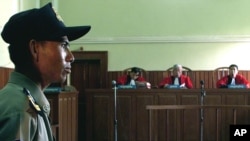WASHINGTON DC - Analysts say Cambodia needs to reform its judiciary without delay, as an important part of its development plan. This will require a statute to prosecute corrupt judges and other court officials that remains in the draft stage.
“If they are violating the law, there needs to be a court, and the court needs to be independent,” said Lao Monghay, an independent political analyst.
The Cambodian government has failed to draft and pass laws that would insulate the courts from political pressure, would strengthen the independence of fair judges and prosecutors and would punish corruption.
At the moment, the judicial system is widely seen as beholden to powerful business and political interests, highly susceptible to corruption, and little trusted by common Cambodians. Court officials are mostly members of the ruling Cambodian People’s Party, whose members often see favorable court results. Some judges and prosecutors are afraid to make independent decisions, lest they lose their jobs.
Cambodia has no up to date laws specifically designed to check the power of judges, prosecutors and other court officials, said Suon Bunsak, executive secretary of the Cambodian Human Rights Action Committee. “The judges and prosecutors have not had the laws…to administrate the court, which also are still in drafts,” he said.
Cambodia does have a Council for Legal and Judicial Reform, which is under the Council of Ministers. Its secretary-general, Suy Mongleang, said legal experts are drafting better laws to regulate the courts.
“These laws will be out soon,” he said. The laws are complicated, because they involve three branches of government, he said. “That’s why we need a little time.” It could take as long as 10 years to reform the administration of the courts, he said.
However, critics say the government is dragging its feet on court reform. The draft law related to the conduct of judges has been in draft stage for 12 years. It includes a section originally stipulated by the Supreme Council of Magistracy that prohibits political affiliation for judges and prosecutors.
Sok Sam Oeun, a lawyer and head of the Cambodian Defenders Project, said the draft, as originally envisioned by the Magistracy Council in 2000, would allow judges to be more independent.
That section appears to have been removed from the current draft, a copy of which was obtained by VOA Khmer, dated June 26, 2005. Instead, this version says judges should make ruling “on the principal of impartiality.” It also says the judiciary “shall not be subject to the legislative or executive branch or any other political party.” That language is more ambiguous than in earlier drafts.
A judge who spoke to VOA Khmer on condition of anonymity, because he did not want to be punished for talking to the media, said many judges would welcome a law that would protect them from reprisals from politicians in power that limit their independence.
The draft law contains a number of provisions aimed at increasing the competency of the judiciary. It requires judges to retire at age 60, with some exceptions. It stipulates punishments, from verbal reprimand to suspension to forced retirement, for ineffective judges and prosecutors. And it mandates that they move courts every three years, to prevent cronyism and other threats to judicial independence.
Today, many judges have remained in the same court for a decade.
Son Chhay, a parliamentarian for the opposition Sam Rainsy Party, said a law must be passed to ensure that judges and prosecutors work for the benefit of the nation.
“This law, required by the constitution, enables judges and prosecutors to have a law that scrutinizes them, does not let them do things arbitrarily, and ensures their quality and responsibility,” he said.
Government spokesman Phay Siphan dismissed criticism of the opposition and rights groups, saying the government has done much to improve the courts, including training for judges.
Kim Sophorn, a judge at the Ministry of Justice who helped draft the 2005 law, told VOA Khmer that there are in fact four laws out now to help regulate the courts, all related to the civil and penal codes. The only piece missing now are the statutes specifically related to judges and prosecutors. “But I know the Council of Ministers is trying its best to prepare this law,” he said.
Judiciary Increasingly Needs Overhauled, Legal Analysts Say
- Sok Khemara
- VOA Khmer

However, critics say the government is dragging its feet on court reform. The draft law related to the conduct of judges has been in draft stage for 12 years.



